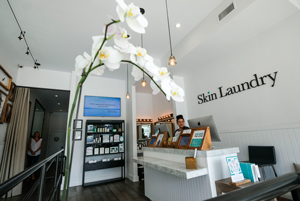Editor’s Note: This article has been updated from it’s original version.
Laser treatments to smooth out facial wrinkles and clear up skin imperfections can cost thousands of dollars at medical spas and cause weeks of itchy, peeling skin.
Skin Laundry, a Santa Monica business that opened a clinic in London this month – its 14th and fourth overseas – has set out to upend that market by offering a $65 deep-cleaning procedure that involves no recovery time. The company is so confident in the two-step facial treatment that it is the only one offered.
The company, which has a fourth New York outpost set to launch in October, also announced a distribution deal for its product line with retailer Sephora in January.
Yen Reis, founder of Skin Laundry, said she wanted to change how consumers viewed laser procedures by introducing a quick, pain-free alternative.
“I really just took something that has been offered traditionally in the market but repackaged it,” she said. “A lot of people associate lasers with being expensive, painful, and stripping your skin off, leaving it raw. I wanted to remove that stigma and really let them know that what we do is more of a facial.”
Launching a business offering a single service might have been written off six years ago, but companies such as Drybar and SoulCycle have since shown the tactic can prove successful with the right branding and service.
James Dion, founder and president of Chicago retail consulting firm Dionco Inc., said that while Skin Laundry’s aesthetic and name are unique, it faces challenges to grow its business.
“The cost of the laser equipment and the skilled people needed to administer the treatment really does limit the number of outlets you can open,” Dion said. “And to have five, 10, or 15 treatments over time for maintenance is not for your normal millennial or 30-something.”
Reis, 37, said the business is on track to generate about $10 million in revenue this year, about $770,000 a store for the 13 that have been open this year. She acknowledged that operating costs for each location can be high, but the company has been able to offset that by pushing for more volume.
Changing lanes
Reis launched Skin Laundry in 2013 after arriving in Los Angeles from Singapore, where she owned a contemporary art gallery following a career in Tokyo trading crude oil futures.
Suffering from hormonal acne, Reis said she became a fan of mild laser treatment while living in Asia but could not find similar options when she moved to Los Angeles.
Funding the business herself, she came up with an interior design that would evoke a beachy California vibe with neutral tones and plush seating. Customers check in through an iPad and are taken to a treatment room where a staff member begins the “Laser and Light” procedure by delivering a laser pulse to the skin to clean pores and stimulate collagen. A different type of laser is then used to deliver high-intensity pulses of light to even out skin tone and reduce redness. Skin Laundry’s toner and moisturizer is then applied to the face and the customer is out the door in less than 15 minutes.
“The only way we can offer this treatment at this price point is … volume,” she said.
While Skin Laundry built its name on a single treatment, it has added other revenue streams. Its skin care line, featuring cleansers, toners, and moisturizers, was launched last year as an extension of the company’s brand. And the deal with Sephora allows Skin Laundry to put its name in front of a whole new set of consumers.
“Sephora is always looking for hot new concepts,” said Dionco’s Dion. “For Sephora, it is not a very big risk.”
Reis said the company’s plan is to focus on expanding its locations at home and abroad. While Skin Laundry has expanded into offering neck and chest laser treatments as an added service, Reis cautioned that customers shouldn’t expect any major changes to its services just yet.
“Sticking to what you know works and what’s the most efficient, effective, and affordable,” said Reis. “People like that.”

